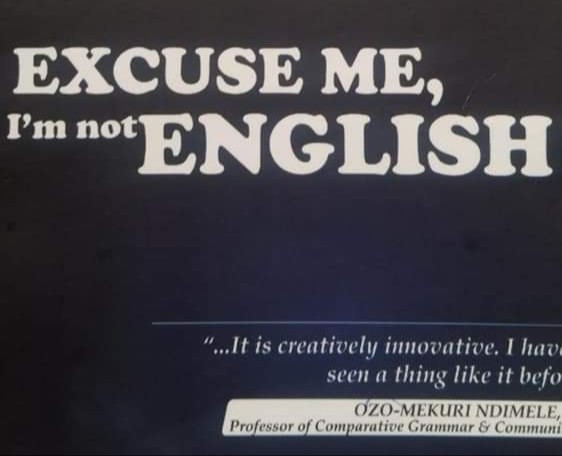“Excuse Me, I am Not English”… As So What? | A Enideneze Etete Book Review
"Excuse Me, I am Not English"... As So What? | A Enideneze Etete Book Review

“Excuse Me, I am Not English”… As So What? | A Enideneze Etete Book Review
This book review titled “Excuse Me, I am Not English“… As So What? is written by Enideneze Etete.
When a friend of mine lecturing at one of the Federal Universities outside Bayelsa State, spoke to me about the novel, Excuse Me, I Am Not English, I pensively posed him the question: And so what?
He responded by describing the novel, as that, which uses storytelling as a contemporary method to effectively teach readers the rule of grammar and help them to improve their expressions. He quickly added that, he has recommended the book to his English and Communication Studies students hence they need copies of it.
After the gist, he generously lent me the only copy he had bought from a bookshop.
I had heard of the book, seen it on the shelf at a major bookshop in Yenagoa City, as well as on the internet but I had not read it, until my friend motivated me to do so.
The small book of 217 pages, printed in easy-to-read point-size, is loaded with 32 short but engaging chapters. The fictional novel, first published in 2020 by Optimum Learners, based in Port-Harcourt, was revised early 2022.

Authored by Bayelsa-born, Mr. Ikiemoye Iniamagha of Akassa, the book uses an unconventional pedagogical method to demonstrate correct use of English Language.
Therefore, apart from its entertainment value, the book is also useful for those who wish to know the rudiments of grammar, to enable them speak and write correctly in formal situations and in social interactions.
In the book, the young author presents popular but wrong grammatical expressions that are often taking for granted. Such common mistakes impede effective communication in examinations, business, leadership, administrative, mass communication, religious and other important formal and social situations.
Correct expressions are also presented, with the differences and grammatical rules explained to the understanding of readers.
The author’s use of creative storytelling, prosaic and conversional dramatic techniques, spiced with real daily human activities, would make readers to master the rules of grammar and syntax, with ease.
For instance, some of the taking-for-granted wrong expressions highlighted in the novel include:
“… don’t take it personally; letterheaded or letterhead paper; don’t take it personally; matured women; I called you severally but you didn’t answer; delivered baby; the reason is because, the reason why; knowing fully well; stuffs; night vigil, night wake, wake keeping; exercise patience; yesteryears, I forgot my purse; travelling bag; crack your brain, and electioneering campaign”.
Other common mistakes culled from the book are, asking a non-intimate person the question: How was your night?; funny enough; mannerless; all manners of people; borrow me your pen; of recent; return back; opportuned; more grease to your elbow; vandalisation; horning instead of honking; plate number; itch in place of scratch; be rest assured; work experience, and many more examples.
The innovative work by Mr. Ikiemoye re-enacts classics such as English without Tears, by Beatrice Elizabeth Pryse; Common Mistakes in English, T. J. Fitikides; Practical English Usage for Overseas Students, by P. S. Tregidgo; Dr. Obina’s Use of English and the works of S. M. O Aka, Benson Oluepke, David O. Eyiyere, respectively. Old school students could recall how these books and Effective English series helped them to master grammar for writing and speaking.
Ikiemoye’s work under review, takes steps farther than these classic books which are nearly out-of-publication. He uniquely presents his ideas in fictional stories based on mundane activities, which resonate with the reader. The approach has been conceptualised by experts as a contemporary experiment in Linguistic and Literary studies, to ease teaching of English Language, thus academic studies are focusing on it.
Apparently, the storytelling approach stems from the idea that man is a Homo Narrens specie which likes telling and listening to stories, thus such a method would be suitable for teaching abstract concepts.
The novel, Excuse me, I am not English is the product of Ikiemoye’s graduate and postgraduate backgrounds in Linguistics and Communication Studies, from the University of Port-Harcourt, where erudite scholars mentored him. He also brings to bear, in the book, experiences garnered from his postgraduate studies at the United Kingdom, the native home of English Language. His broadcast media practice background, also reflects in the rich content of the novel.
The author harps on Prescriptive Grammar, given the worrisome trend of misuse of English Language in recent times. Prescriptive perspective emphasises strict adherence to the conventional rules of grammar and syntax, in line with standard British English, ideally the norm for formal communication in Nigeria as well.
Thus, the correct versions of grammatical expressions presented in the book are based on the Prescriptive perspective, recommended for writing and speaking in academic and other formal situations.
This perspective may have inspired the author to aptly title, the novel as, Excuse me, I am not English. The title apparently depicts cultural settings in which standard British English may not mean much to users of English as Second Language (non-British speakers).
More over the title and the author’s quest to encourage good use of English tally with the fact that, it is standard expressions that are required in academic and other formal situations, for result-oriented communication, generally.
No doubt, the popular-wrong grammars, otherwise labeled as Nigerian English in our clime, constitute barriers to effective communication in formal and even non-formal settings.
In O’ Level examinations, university entry, and course examinations, examiners trickily include the popular-wrong expressions as options in Lexis and Structure Objective Test Papers. Many students fall prey to the trick.
Some professionals, managers, entrepreneurs, the clergy and other classes of persons have also had bad times, for not being able to write and speak correctly and persuasively, to achieve goals.
However, every language thrives on culture, group dynamics, communication contexts and even the technologies used for sending messages. Given these factors, the perspective of Descriptive Grammar, also has a place in human communication.
The Descriptive approach does not emphasis judgmental analysis or strict adherence to the prescribed rules of grammar and syntax. It concerns itself with the usage of English, among people who share similar cultural behaviours, and how they naturally express ideas. Thus, conventions of grammar are relaxed, particularly in non-formal situations, as far as communication takes place between parties.
Ikiemoye’s Nigerian nativity, where English is not Mother’s Tongue, and his academic baptisms, which exposed him to different genres, made him to realize that a storybook for teaching right grammar, must stress the prescriptive perspective to achieve the goal of his work.
Yet, he consciously touches the descriptive aspect as well. This is vividly noticeable from the use of pidgin, vernacular and colloquial expressions, to convey his ideas. Interestingly, the nonstandard grammars are alluring to readers, especially, those who are not experts in English or those who are not too bothered about good use of English. Therefore, the author applies this integrated technique in order to achieve his goal for writing the book.
After all, as human society is dynamic, so language also evolves. Hence, Descriptive English provides experimental ground for Linguists to help develop rules. This also makes publishers of dictionaries, to update and include new words. For example, Webster’s Dictionary and others have recognised staffs (i.e., workers) as plural for staff, as popularly used in America, while Britain does not add the “s” to form plural.
The Oxford Advanced Learner’s Dictionary has recognised chop, chop-chop, Danfo, eat money, guber, next tomorrow, to put to bed, send-forth, zoning tokumbo, sef, K-leg, severally, buka, bukateria, Mama put, to rub minds, non-indigene, barbing salon, okada sabi, gari and others from Nigerian version of English.
Information Communication Technologies and Social Media have also brought about new dictions and expressions such as hi-tech, Netizens, blog, blogging, cyberspace, tweet, nop, post a story, and many more.
These kinds of words and expressions are peculiar to specialised fields; countries or regions, thus classified as native to where they originate from or the specialised fields, and then labeled as nonstandard, until they evolve to gain general acceptance as standard words/expressions.
Given Ikiemoye’s unique techniques and the content of Excuse me, I am not English, there is no doubt that the innovative effort by the budding author, lecturer and broadcast journalists, is gaining recognition.
The Bayelsa State Ministry of Education, under Dr. Gentle Emelah as Commissioner, has listed it among recommended books for schools. Public and private pre-tertiary and tertiary institutions, within and outside the state are also recommending the book to students for specialised and general studies.
Instances are Niger Delta University (NDU); Bayelsa Medical University (BMU); Ignatius Ajuru University of Education (IAUE): Kaduna Polytechnic; St. Jude’s Girls Secondary School, Amarata; Bishop Dimieari Grammar School, Yenagoa; Ijaw National Academy, Kaiama; Federal Government College, Odi and Belary Schools, Yenagoa. Other institutions where the book is expected to make inroads after lecturers’ strike, are University of Port-Harcourt; Ahmadu Bello University (ABU), Zaria and others where some lecturers and students in disciplines that the book is relevant to, are demanding for it.
The book has also earned the writer, invitations for speaking and training engagements in schools and other kinds of organisations, within and outside Bayelsa State.
Indeed, the recommendation of the novel, Excuse me, I am not English, by Bayelsa State Ministry of Education, academic institutions and individuals, is not a misnomer.
This is more so, as experts in English Language, Literally Studies, Linguistics and Communication have also endorsed the book as a useful resource, for those in these disciplines as well as general readers. Among erudite scholars of these disciplines, who have endorsed it are Prof. Ozo-mekuri Ndimele; Dr. Eze Ibekwe, all from University of Port-Harcourt; Prof. Diri I. Teilanyo of Federal University of Otueke-Ogbia.
It suffices to say that Excuse me, I am not English is a credit, not only to Ikiemoye, but also to Bayelsa State, the Glory of All Lands and Nigeria, the same way his debut novel, The Day Heaven Slept, has received encomiums.
My stand is that, the novel, Excuse me I am not English, could provide value for the precious time of its readers. Therefore, it may serve as a companion to those who wish to understand grammar and communicate effectively in their daily endeavours.
After all, the best way to know that we may not have known everything is to read a book written by another person, and then it would dawn on us, that there is always something new to learn. Thus, the book under review, could serve the needs of all classes of persons who wish to master grammar, refresh or teach others, in order to attain the purposes of communication.
I wish that the author could expand the content of the book in a subsequent edition or publish a second volume, to present more common-mistakes and their correct versions as well as explanations.

A new edition or new volume, could treat more of the problematic aspects of prepositions, compound and singular nouns, subjects and objects, numbers and quantities, singular and plural verbs, active verbs, reported and passive speeches, numbers and quantities, gerunds and question tags, spellings, pronunciations, homophones, as well as antonyms and synonyms.
These aspects, could tackle wrong expressions such as – I does not know, instead of I do not names are…, instead of my name is…, in bed versus on bed; on campus versus in campus; on notice board versus in notice board, etcetera.
So far, the critical review of Ikiemoye’s Excuse me, I am not English, answers the, so what question posed earlier by this reviewer, just as superior scholars and some readers have also given similar opinions.
READ ALSO:
- Serena Williams: Lessons From a Life of Focus Writes Osita Chidoka
- Tonye Ziprebo Writes On Governor Wike, Ayu, Atiku and PDP
- MFM 70 Days Fasting And Prayer 3 SEPTEMBER 2022 – Day 27 Prayer Points
- MFM Power Must Change Hands September 2022 Live Service
- In Touch Ministries Devotional 3 September 2022 Charles Stanley Titled How to Deal With Sin
“Excuse Me, I am Not English”… As So What? | A Enideneze Etete Book Review
————— | HOME | ————-
| Arts & Short Stories | BBNaija 2022 | Business News | Education News | Entertainment News | Featured | Gospel News Today | Health and Fitness | Interviews | Latest News | Movie Review | Niger Delta Today | Online Comedy Skits | Politics Today | Trends & Lifestyle | TV Reality Shows | Sports News | World News |



